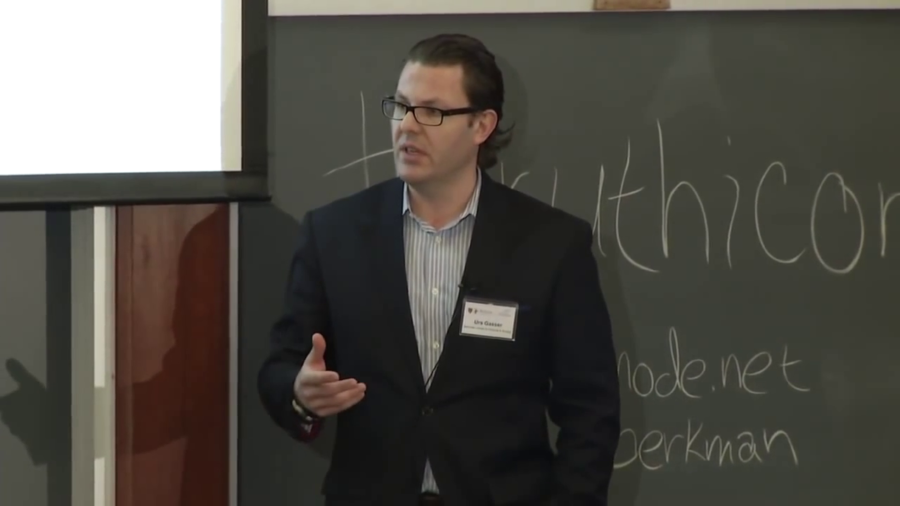John Palfrey: So, it’s my great pleasure to introduce to you Urs Gasser. Ur is someone who has been with the Berkman Center for a long time now. We’re extremely lucky that he is our Executive Director. He was a professor at the University of Saint Gallen and an expert in what we think of as information law. He also comes from a tradition of studying this matter from a methodology that’s actually somewhat distinct from the way that we study information and the way we study Internet and technology. So we’re incredibly lucky that he is both our Executive Director and a great expert on this. This is his core topic of information quality. He’s going to run us through a very brief presentation, and then I will turn it over to Ethan Zuckerman, our close colleague from MIT Center for Civic Media. Professor Gasser, thank you.
Urs Gasser: Thank you so much. Good afternoon. Welcome back. As John mentioned this is somehow a dream come true for me. The topic of information quality has been one of my pet topics for many years, so I’m really excited that you’re all coming together here today.
I would like to thank first our colleagues and friends at the Ford Foundation for making this possible. But then of course also our colleagues and friends, in particular Ethan, over at MIT. I’m thrilled that over the next few years we will for sure strengthen our collaboration, and I think this is a terrific start. So thank you Ethan to you and your team.
And then finally of course also thanks to the Berkman team for pulling this together, after especially last week’s event with Lady Gaga, which was kind of quite a challenge for us. And a big thank [you] especially to Susan, who did a great job moderating the morning session. Thank you Susan for that.
So what I would like to do over the next few minutes is really to do two things. First of all to highlight some of my key findings from this morning. I’m sure you have many others to add, so this is kind of just one interpretation of what I’ve heard. And to try to map these insights on this kind of emerging theory of information quality which as John mentioned is more of a European frame or approach to the topic here.
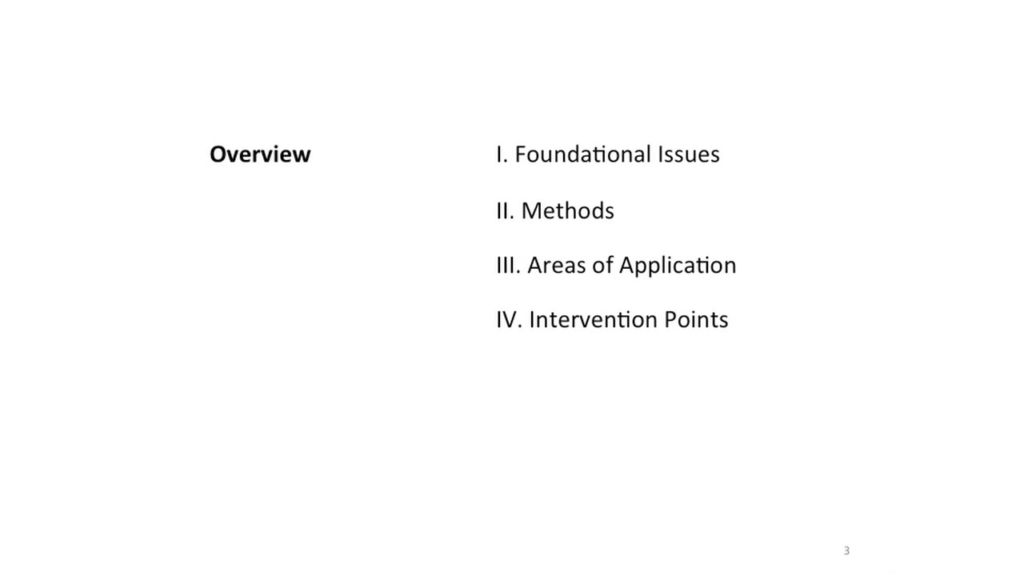
I’d like to cluster my thoughts and structure them into four categories. One is what I will call foundational issues. Second, a few words and observations regarding methods. Third, a few areas of application that we touched upon this morning, and maybe also highlighting one or two that we haven’t talked so much about but that I think are increasingly important. And then finally also as a segue to the following sessions, a few words about potential points of intervention.
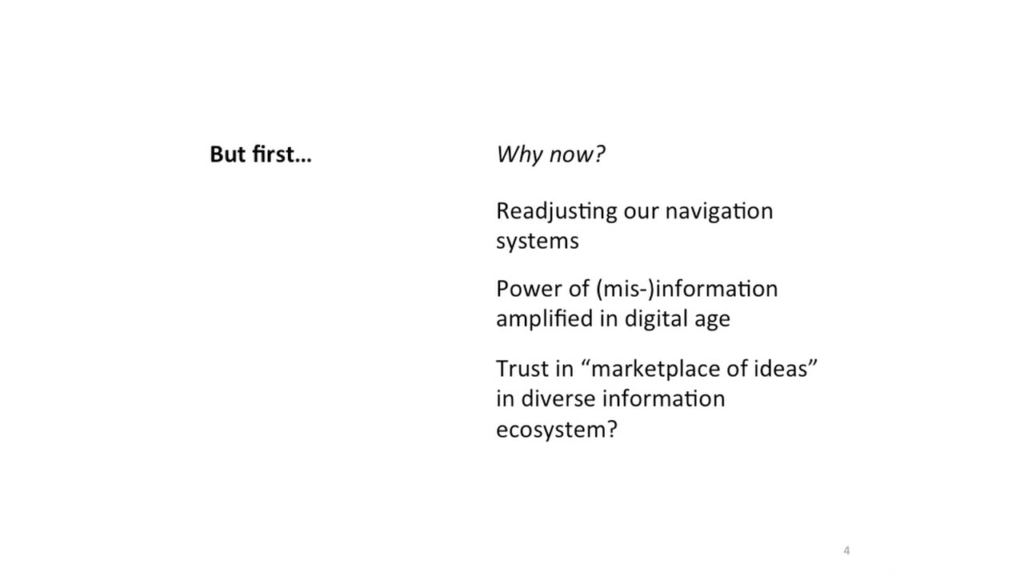
But before I do that just a very quick question or provocation. Why do we have this conversation right now about truthiness, about truth in the digital networked environment? I remember distinctly when I arrived here roughly ten years ago, information quality was not a very popular topic here. Actually no one was really interested in it, so again I’m really glad to see so many colleagues here today at the law school coming together.
And it’s really a question, why do we talk about that today, the question of truth online? I offer three possible explanations. One is that we feel collectively that it’s time to readjust our navigation systems, as we are confronted with a new a technology but also of course with new players or intermediaries disappearing and new intermediaries entering the information ecosystem. We’ve covered a lot of that ground this morning.
A second possible explanation why we have the conversation about quality of our information ecosystem now from that particular angle may be the understanding of power of misinformation. As it was noted this morning, we even started wars based on misinformation recently.
And finally and that’s perhaps more a European provocation, it’s not so clear to me whether the diverse ecosystem that we have today, the diverse information environment that we live in, produces always good outcomes, necessarily and automatically. So whether this vision and idea of just create enough speakers and enough information sources and then the marketplace of ideas, through this kind of invisible mechanism, will lead to the truth and to the good outcomes, that this trust may be eroded in today’s environment.
So these are I think three offerings from my personal perspective.
But now, switching to a summary and mapping mode, first we’ve got the reminder from our colleague from the Kennedy School this morning that we should be more specific about the language you use about definitions. I’ve heard a couple of things this morning that were extremely helpful in clarifying my own thinking. We had different notions of information actually that were used, sometimes information as bits and bytes. The raw data that we are concerned about, the quality of the raw data but then of course also about information as message and effects. Some of the things Yochai was talking about. We also covered I think different types and addressed the nuances between different types of information. We talked about factual information, but of course also opinions and beliefs. So I truly believe also from a theoretical perspective it’s very important to distinguish these nuances.
One other thing I want to highlight here is really what I liked so much about this morning’s conversation is that we have been rethinking in many ways the information model and information flow model. So the question how we are exposed to information, or actually how we find the information, be it through search engines, be it through browsing, plays very much a role of course in this conversation. So it’s no longer that we just are exposed to information that someone has selected for us. And to see search as part of the information process that has a relevance with regard to truth and quality and truthiness as one quality criteria I think is important.
Also the recreation and reuse part that we interact with information, with digital content. And that this again shapes our skills and ability to make quality judgments. So I really like this enriched model of information flow that is very different from the conversations we had even fifteen years ago with focus of newspapers. So I truly think this reflects the shift from an analog to a truly digital model, this kind of more nuanced understanding of how we interact with information.
Just another quick observation point from this morning. Truthiness or truth have been two of the quality criteria we mentioned a lot. There were others mentioned, for instance correctness of information, information that is not misleading. And I think indeed there are a broad range of information quality criteria we could also look at in the context of our conversation today.
One colleague of mine did a mapping and came up with seventy different quality criteria. Some of them again more on the subjective side, where your previous knowledge for instance plays a big role, or some of the subjective factors we talked [about] today, and some of them more on the objective side. But either way. Also the acknowledgment this morning that context matters so much when we talk about these quality criteria, be it truthiness or be it correctness of information.
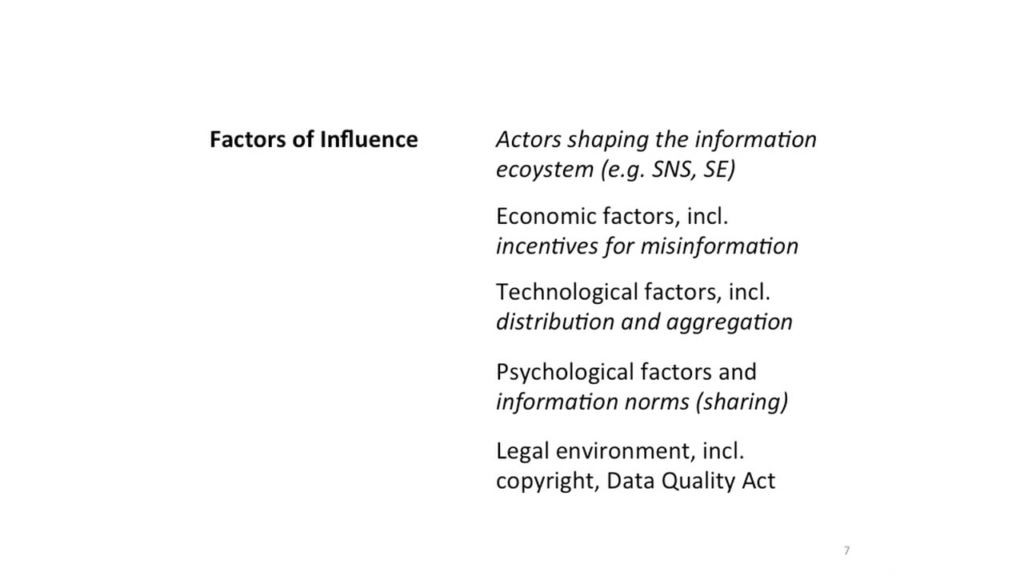
A second outcome certainly of this morning’s session, what are key factors of influence? And I just listed a few here. Of course the new actors that are shaping our information experiences online, we’ve put a lot of emphasis on that. Not so much, actually—and I’m a little bit surprised by that—we didn’t talk so much about social networking sites. But maybe we’ll come back to that later this afternoon. Search engines have been certainly mentioned.
Economic factors have been addressed. Arguably one could make the case that in the attention economy, the incentives for misinformation may actually grow. We also talked quite a bit about the technological factors, the logic of distribution as well as aggregation network effects, affect the current information ecosystem in a way that is directly relevant with respect to the notion of quality.
Then in the later part of the morning of course, the discussion of the importance of the human or psychological factors, some of them even hard-wired. The role of emotion, the role of the amygdala in our brain, right. But that some of them of course also through learned behavior and socialization, cultural biases, and other aspects were helpfully highlighted this morning, and perhaps we can think about and brainstorm about tools and design choices that shake things up a little bit, especially where it’s more learned behavior rather than hard-wired biology.
Charlie made a great point on the importance of the legal system, how the legal environment shapes, actually, the notion of truth and other quality criteria in a very direct way, but there are also indirect ways in which law shapes our info quality environment.
One thing I want to add or highlight is the Data Quality Act. You didn’t mention that this morning, but that’s a piece of legislation that applies to federal agencies and tries to regulate the quality of information and data these agencies put out there. And if you go back to this idea of open data and open government you see the relevance of that. That’s just kind of as a footnote, an interesting way in which law can actually be helpful sometimes. Although, Herbert Burkert, my friend, summarized it at a different conference that information quality is a topic best to be avoided by law.
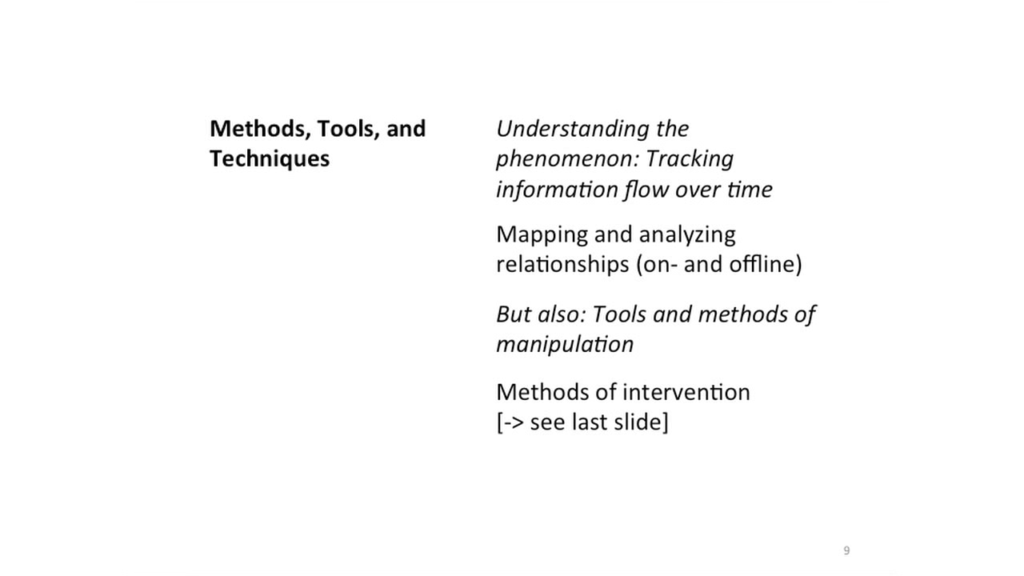
A few words on methods. What is really different—and actually the stuff in italic is what I think has changed in the digital environment is we have different methods and tools and techniques available to understand the phenomena we’re discussing today. Yochai with his team did a great presentation, how we can track the flow of information over time. How we can map and analyze relationships. Of course the Truthy tool that he had is a similar idea. I think that was not possible to the same extent, or at the same scale at least, in the paper world.
But of course also as we learned this morning and Wendell started with the provocation, the tools and techniques of manipulation have also changed, and of misinformation.
And finally, and I will return to that on the last slide, of course also the methods of intervention, what you can do about it. We had several great ideas and starting points for sure addressed this morning.
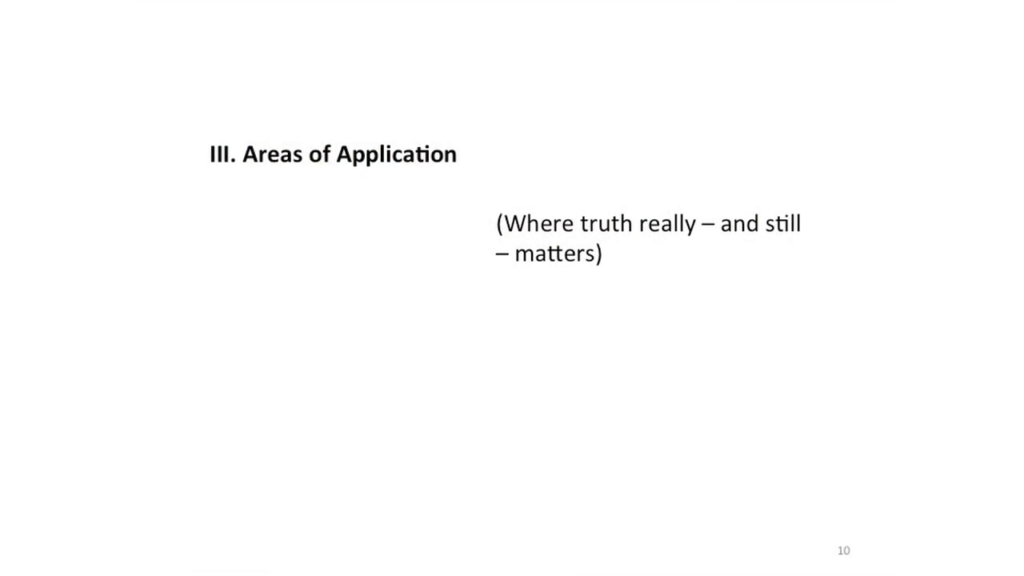
Very briefly only, our areas of application. Where truth matters and still matters. Of course there are many areas we could look into, and given the contextuality of the information phenomenon, I argue it’s really important to not only have these kind of horizontal conversations as we have it today, but get sector-specific, so to speak, and look into different areas.
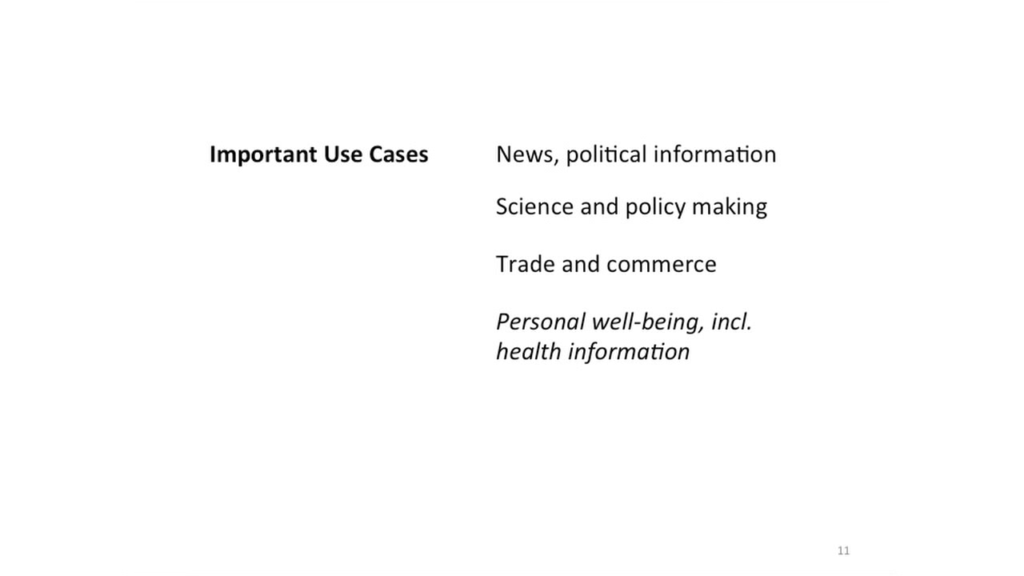
Of course today we have a certain emphasis on news and political information. We’ve also addressed the question of science and policymaking, and the importance of maintaining quality in those debates. Trade and commerce are another important area. We talked a little bit, Kathleen addressed the advertisement issue. One that I would add is personal information, personal well-being, as including health information. That is a key area where arguably these quality considerations are extremely important. Again, last week we we had here this conference on cyberbullying and other forms of problematic behavior online. And there again you see the relevance of the same type of question about the quality of personal information.
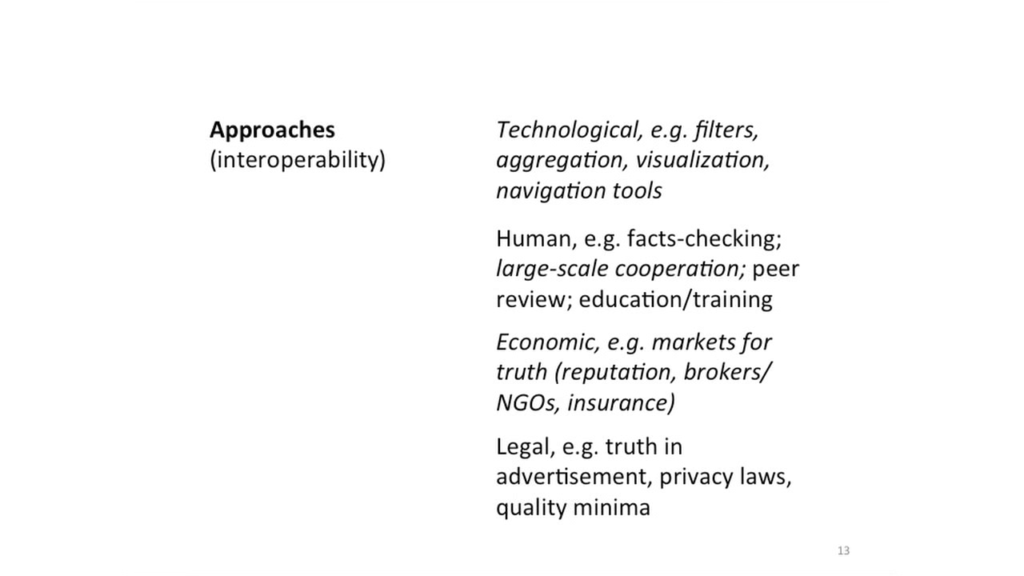
Finally, intervention points. (Finally in terms of the summary.) It’s almost following the Lessig framework, four modes of regulation with of course technological means, and tomorrow is the hackathon. We will certainly experiment with that. Can we create filters, aggregation tools? How helpful can visualization techniques be to address some of the challenges to sort through the truthiness problem? What are navigation aids for cyberspace?
But then also another key area we highlighted this morning, the role of human beings. The role of actually people doing fact-checking. The potential and power of large-scale cooperation. Peer review, mentioned by Yochai again. But also the role of education and training of journalists. But young people more broadly. And Denise wrote a great piece on the blog leading up to this conference on this topic.
Of course there may be also an emerging market for truth. NGOs are playing a big role in that, supported through foundations of course. New types of information brokers emerge, because obviously accurate information has a high value. So again there is a broad range of instruments and also opportunities to think creatively about the use of market forces and the incentives available. We identified some of them.
And of course also finally, being at a law school some legal topics and legal strategies, despite Herbert Burkert’s words of warning, truth in advertising—regulation seems to be kind of one possible contribution. Privacy laws and also looking at the recent White House roadmap with a potential right to correct information if it’s not correct personal information. These are possible tools and instruments in the toolbox.
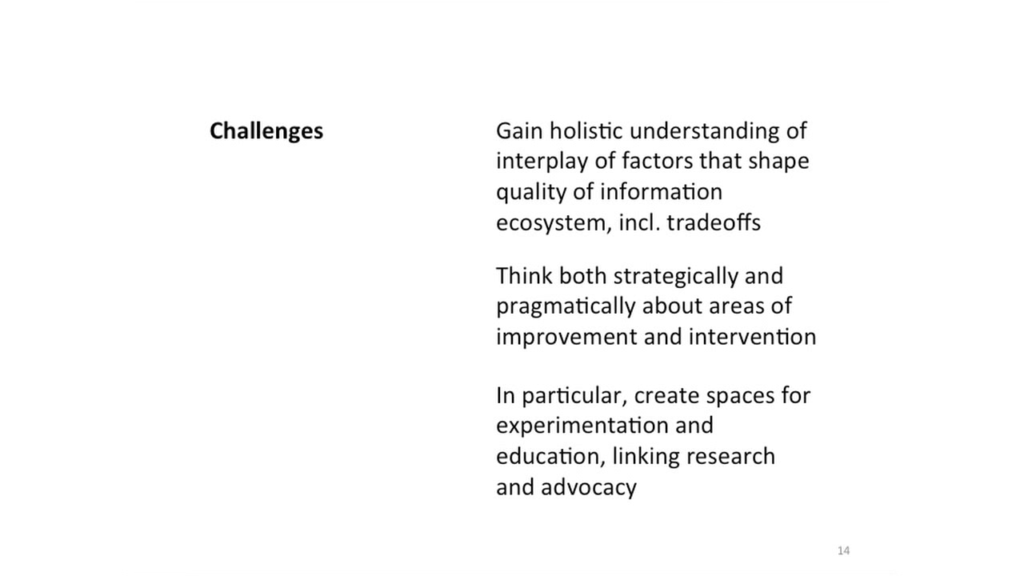
Last slide, challenges ahead. Now, from a research perspective first, this morning confirmed my at least working hypothesis that we have a relatively good understanding already, and insights into various bits and pieces that are highly relevant. So take for instance what we know about the psychology of information processing, or about network analysis. What we know about how for instance information travels in social networking sites.
But bringing these things together and developing some sort of holistic view and work towards a more comprehensive understanding and understand also the interplay among the factors, including tradeoffs, seems to be a research challenge.
Second challenge. I would encourage all of us to think both strategically as well as pragmatically about where can we make a difference? Where can we improve the current ecosystem? And what are strategies that we can apply longer-term? I would argue both one and two require the creation of spaces for experimentation and learning, and also spaces where activists and researchers can meet and think together. And in that sense I believe today’s conference has been a great starting point, so thank you for being here.
Further Reference
Truthiness in Digital Media event site
